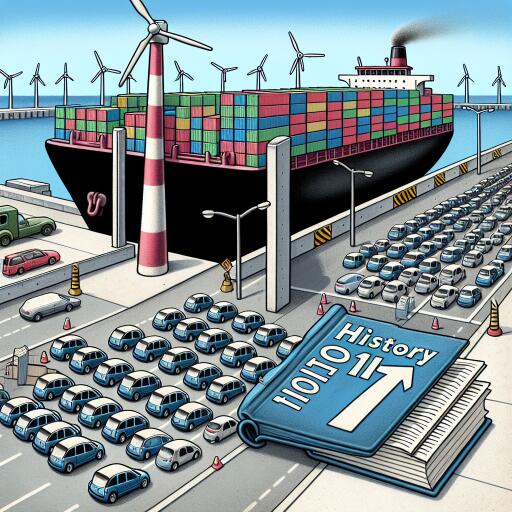In a move that many are comparing to a pivotal moment in America’s automotive history, President Biden’s proposal for a 100% tariff on Chinese electric vehicles (EVs) is stirring debates and drawing criticism for potentially missing the mark on several fronts. This decision has been interpreted as an attempt to bolster the American EV industry against Chinese competition, but it echoes a historical challenge that may offer lessons for today’s policymakers.
Rewind to 1972, coinciding with Joe Biden’s entry into Congress, America faced an energy crisis prompted by the OPEC Oil Embargo. This crisis exposed the unsustainable nature of America’s heavy reliance on massive, fuel-guzzling cars in light of soaring fuel prices. In contrast, Japanese automakers like Toyota, Honda, and Nissan, capitalized on this crisis by producing affordable, fuel-efficient cars. Eventually, these companies established manufacturing plants in the US, catering to a segment of the market that Detroit automakers had overlooked.
Back then, the Japanese automotive incursion was met with apprehension, framed as a battle for economic supremacy. Ronald Reagan’s administration sought to ease competition through negotiated voluntary export restraints with Japan, displaying a nuanced approach to managing foreign competition while safeguarding American jobs and interests.
Fast forward to today, and the automotive landscape has shifted towards electric vehicles, with China emerging as a leader in this technology. This pivot has placed Biden in a position where historic parallels offer invaluable insights. Instead of imposing severe tariffs, an alternative approach reminiscent of Reagan’s strategy with Japan could be to facilitate Chinese EV manufacturers setting up production in the U.S. This approach would ensure access to affordable EVs for American consumers, particularly beneficial for those who cannot afford the high-end models produced by American and established foreign car makers.
The automotive industry has always been more than just about cars; it’s a reflection of socio-economic trends, national priorities, and international relations. The introduction of Japanese cars in the 1980s helped address a gap in the American market, serving consumers who were underserved by domestic automakers. Today, the challenge is different but conceptually similar, with a pressing need for affordable, sustainable transportation solutions amid the climate crisis.
Biden’s tariff proposal, however, seems to ignore the potential benefits of embracing Chinese EVs. It’s seen not only as a missed opportunity to champion sustainable transportation but also as a move that could strain American consumers and dampen progress towards electrification. Union interests and Sinophobia play significant roles in this decision, contributing to a complex web of considerations that might not align with the broader public interest or environmental imperatives.
Moreover, this protective stance towards the automotive industry contrasts with the broader historical acceptance of globalization and technological exchange that has characterized much of America’s post-war economic strategy. It suggests a reluctance to engage with the global shift towards electrification, potentially at the expense of American technological leadership and environmental objectives.
In conclusion, Biden’s 100% tariff on Chinese EVs raises more questions than it answers. It reflects a confrontation with a changing global order where old adversaries are now leading the charge in key technologies critical for the future. Rather than embracing a protectionist stance, there might be more to gain from fostering an environment that encourages innovation, affordability, and sustainability in the automotive sector. This could involve learning from past experiences with foreign automakers and seeking collaborative avenues that benefit American consumers and the global fight against climate change. By looking back at how America navigated past automotive challenges, there may yet be time to steer the current policy course towards a more constructive and forward-looking direction.
